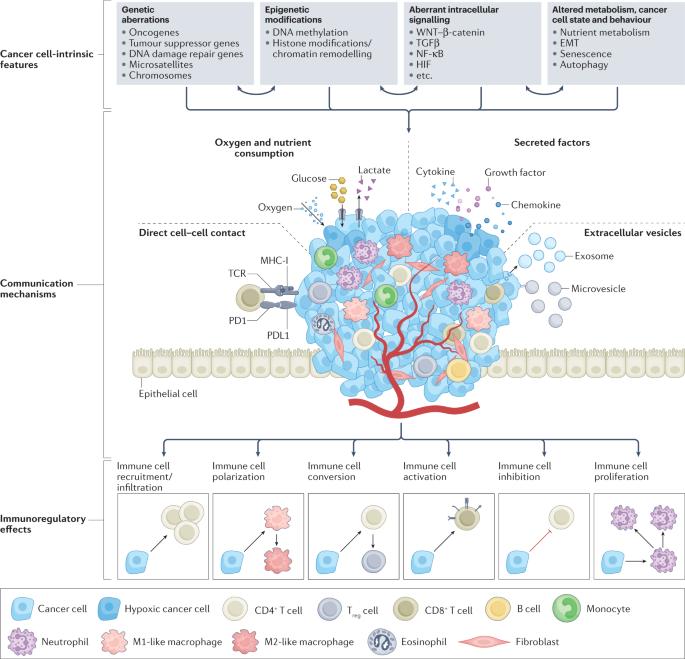驱动癌细胞免疫调节功能的机制
IF 72.5
1区 医学
Q1 ONCOLOGY
引用次数: 27
摘要
肿瘤在免疫细胞的空间分布、组成和活化状态方面表现出惊人的差异,这影响着肿瘤的发展和对免疫疗法的反应。研究肿瘤微环境中免疫细胞多样性和功能的机制,将为开发更有针对性的免疫调节策略、造福癌症患者铺平道路。癌细胞凭借其旁分泌和并分泌通讯机制,是造成免疫环境中肿瘤间异质性的关键因素。在本综述中,我们将讨论癌细胞的内在特征,包括(外)遗传畸变、信号通路失调和代谢改变,如何在协调免疫环境的组成和功能状态方面发挥关键作用,并影响免疫调节策略的治疗效果。此外,我们还强调了针对癌细胞内在参数或其下游免疫调节途径是如何操纵肿瘤免疫环境以促进抗肿瘤免疫的一种可行策略。本综述概述了肿瘤免疫环境的深刻瘤间异质性是如何被癌细胞内在改变所塑造的,并强调了这两个不断演变的系统之间的串扰不仅对免疫调节药物的治疗成功提出了挑战,而且还为克服免疫逃避的新治疗策略提供了基础。本文章由计算机程序翻译,如有差异,请以英文原文为准。

Mechanisms driving the immunoregulatory function of cancer cells
Tumours display an astonishing variation in the spatial distribution, composition and activation state of immune cells, which impacts their progression and response to immunotherapy. Shedding light on the mechanisms that govern the diversity and function of immune cells in the tumour microenvironment will pave the way for the development of more tailored immunomodulatory strategies for the benefit of patients with cancer. Cancer cells, by virtue of their paracrine and juxtacrine communication mechanisms, are key contributors to intertumour heterogeneity in immune contextures. In this Review, we discuss how cancer cell-intrinsic features, including (epi)genetic aberrations, signalling pathway deregulation and altered metabolism, play a key role in orchestrating the composition and functional state of the immune landscape, and influence the therapeutic benefit of immunomodulatory strategies. Moreover, we highlight how targeting cancer cell-intrinsic parameters or their downstream immunoregulatory pathways is a viable strategy to manipulate the tumour immune milieu in favour of antitumour immunity. This Review outlines how the profound intertumoural heterogeneity in immune landscapes of tumours is shaped by cancer cell-intrinsic alterations and highlights how the crosstalk between these two continuously evolving systems not only challenges therapy success of immunomodulatory drugs but also provides the basis for new therapeutic strategies to overcome immune evasion.
求助全文
通过发布文献求助,成功后即可免费获取论文全文。
去求助
来源期刊

Nature Reviews Cancer
医学-肿瘤学
CiteScore
111.90
自引率
0.40%
发文量
97
审稿时长
6-12 weeks
期刊介绍:
Nature Reviews Cancer, a part of the Nature Reviews portfolio of journals, aims to be the premier source of reviews and commentaries for the scientific communities it serves. The correct abbreviation for abstracting and indexing purposes is Nat. Rev. Cancer. The international standard serial numbers (ISSN) for Nature Reviews Cancer are 1474-175X (print) and 1474-1768 (online). Unlike other journals, Nature Reviews Cancer does not have an external editorial board. Instead, all editorial decisions are made by a team of full-time professional editors who are PhD-level scientists. The journal publishes Research Highlights, Comments, Reviews, and Perspectives relevant to cancer researchers, ensuring that the articles reach the widest possible audience due to their broad scope.
 求助内容:
求助内容: 应助结果提醒方式:
应助结果提醒方式:


